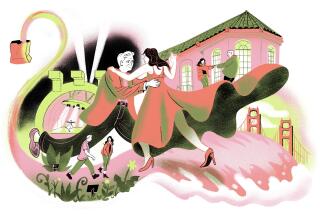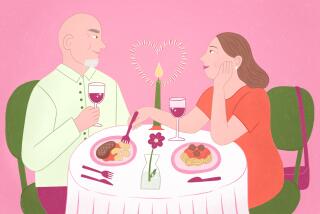Who Pays for a Date? The Cost Can Be High
- Share via
The major concrete achievement of the women’s movement of the 1970s was the Dutch treat.
--Nora Ephron
On their first date, Dana was already looking forward to their second date. Bob, whom she had met at a party the previous weekend, was witty, attractive and a good conversationalist.
“I hope he asks me out again,” Dana thought, as she and Bob lingered over dessert. Then the bill arrived.
“Let’s see,” Bob calculated, “you owe about $22 to $25 with tip.”
Be careful what you wish for; it might come true. Bob called Dana a few nights later to suggest another evening out. She politely declined.
“I’m no princess,” insisted the 28-year-old Costa Mesa film editor, who asked that her last name not be used. “When I’ve been in long-term relationships, I’ve never minded paying my fair share. But it’s a complete turn-off when a guy acts territorial about his money from Day One. It’s immature and geeky.”
Melinda, 31, a marketing executive in Newport Beach, expressed ambiguity over the modern-day dilemma. “I’m a feminist, so in a way I feel hypocritical expecting a man to pay for dates,” she said. “I make a good salary--often more than the men I go out with do.
“So there’s always that moment of awkwardness--on my side of the table, at least--when the bill comes. I think, will it insult him if I offer to pay part of it? If we’ve run up a big tab, I usually offer to chip in. I’ve found that one not-so-awkward approach is to say, ‘May I get the tip?’ Or else I’ll pay for drinks or the movie afterwards.”
Feminist or not, Melinda prefers that the magnanimous gesture be her idea, not his. “A few times I’ve been on a date where the man said, ‘I’ll let you buy the tickets since I paid for dinner.’ I’ve had to restrain myself from gagging.”
“Money is a funny thing; it symbolizes something that goes beyond male-female equality,” Melinda explained. “One thing I’ve learned over the years: a man who is stingy financially is also stingy emotionally. I once had a boyfriend who always made it clear that our relationship was Dutch treat all the way. Finally I caught on to the fact that giving away things--whether they be dinners or commitment--made him feel vulnerable.”
“What does ‘liberated’ mean?” Patricia Peirce, 26, mused in a letter to Single Life. “Just because a woman deserves equal pay in the workplace doesn’t mean that a woman doesn’t deserve to have her dinner paid for when she is asked out on a date. If a man doesn’t expect to pay for the date, he shouldn’t ask.
“I must admit that if a man asked me out and didn’t intend to pay the bill, I would have a difficult time controlling judgment on his character.
“This doesn’t mean that as time passes in a relationship, splitting the bill would be out of the question. Nor does this mean that women shouldn’t ask men out. By all means, ask. But be prepared to pay. This is just common courtesy and has nothing to do with liberation.”
In an interview, the Anaheim resident, who is working on her teaching credential, reiterated her belief that the answer behind who pays depends on who invited--even in platonic relationships.
“I have a longtime male friend who just assumes that, because we’re only friends, it’s always: You pay your way and I’ll pay mine. It kind of bothers me; he’s the one who asked me out. I would just as soon stay home.
“It’s like people who buy things beyond their means--if you can’t afford it, don’t buy it, and if you can’t afford to take someone out, don’t ask them. Or else make plans that don’t cost any money--like a walk on the beach.
“I think it’s kind of self-centered if a man thinks he can ask you out, have you on his arm, take you to a nice place, take you home--and expect you pay for dinner.”
Peirce admitted, however, that she can’t help but feel uncomfortable when she sits back and watches a date pay for an expensive dinner. “I think, ‘Wow, this is costing him a lot.’ In those situations, I’ll offer to pay for whatever we do after dinner--a movie or drinks.”
Carolyn Brown of Laguna Beach had a different perspective. “I don’t go out with a guy unless I enjoy his company as much as he enjoys mine,” the 29-year-old writer said. “I wouldn’t expect a girlfriend to pay for my dinner just because she wanted to spend an evening with me, and I don’t automatically expect a man to pay, either.”
“Then again,” she noted with a laugh, “if a date insists on paying, I don’t exactly lunge for the bill.”
Sometimes Brown would rather pay her own way on first dates, to alleviate her guilt if she decides that once is enough. “I feel like a louse if I let a guy treat me to an expensive dinner, then I turn him down when he asks me out again.”
The range of male opinions registered somewhat similar to the female mind-set. “There’s nothing wrong with a little chivalry,” said Jeff, 41, an accountant in Garden Grove. “I certainly would not expect a date to pay her way, or else I wouldn’t have asked her out in the first place.
“But if she were to become my girlfriend and we went out three or four nights a week, it would get to be silly after a point if I continued paying for everything. I’d go broke.”
Robert slightly resents the fact that “liberated” women still like to be wined and dined. “Some women want everything to be equal, except for the restaurant tab,” the 34-year-old Santa Ana engineer complained.
“There’s something phony about trying to impress someone by taking them to a fancy restaurant. It doesn’t say anything about who you are just because you can pull out an American Express. Women who need that aren’t my type, anyway.”
But Dan, 28, a real estate agent in Anaheim, views footing the bill as part of the dating game. “I would feel like an idiot, asking a woman to pay her half,” he said.
“I simply figure the cost of dates into my budget. To meet the right person, you have to go through the motions.”


